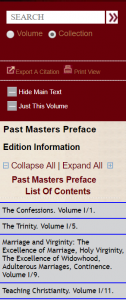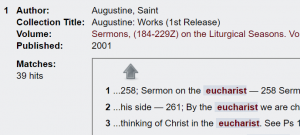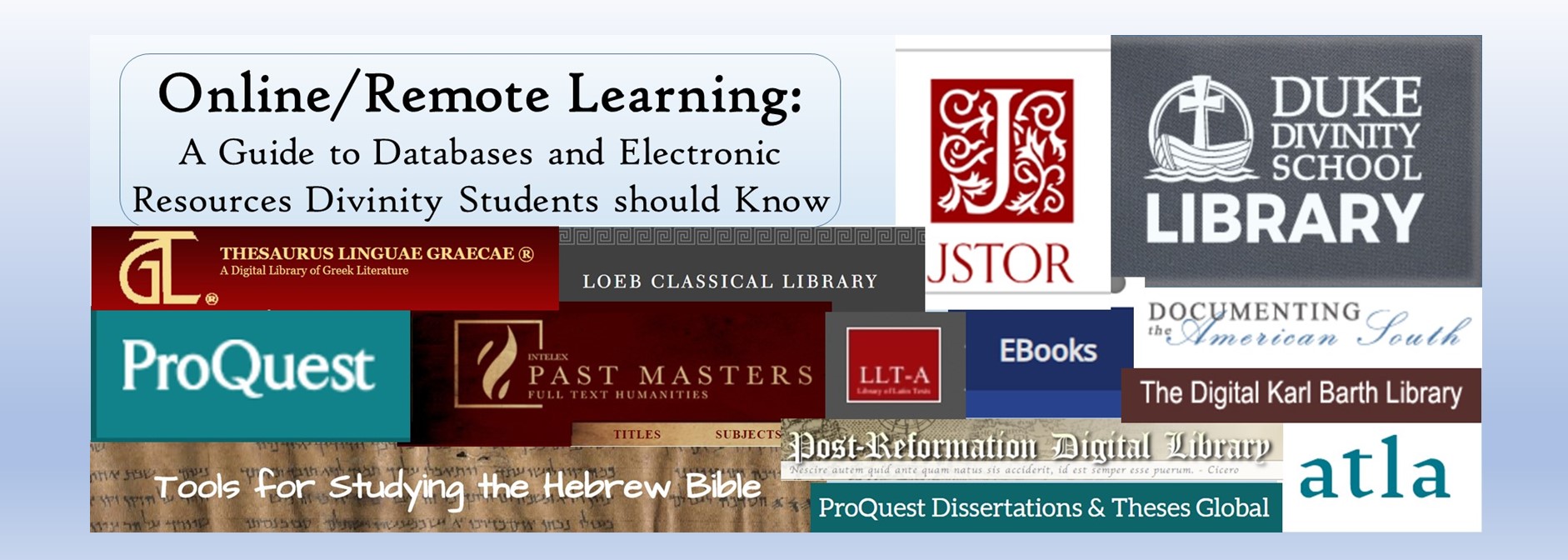
Whether you find yourself researching from your home in Durham or completely remotely as one of our Hybrid students, Duke Divinity Library resources are here for you, 24 hours a day — if you know how to look. Below are some of the most important search strategies and top databases Divinity students should know about:
1. Searching for Electronic Books

Our EBooks tab on the main Divinity Library page searches the Books and Media catalog and automatically limits the results to “Resource Type -> Book” and “Access Type -> Online.” If you do this using “Theology” as a keyword search, you get over 15,500 results! You can also use this strategy to see what commentaries we have electronically to help you with your exegesis paper. For commentaries on Mark, for example, search “mark bible commentary,” and bring up over 100 results. “Exodus bible commentary” brings up 60 results, and “1 Samuel bible commentary” brings up 80 results.
Good to Know: For these searches, it’s important to include the word “bible” because the catalog search will treat all of your search terms as keywords. That means a search simply for “mark commentary” will also bring up any work whose author’s first name is Mark, or that has Mark in the title, etc., regardless of whether the book in question has anything to do with the Gospel of Mark! If you want to learn more about search strategies for commentaries, check out our Guide to Finding Commentaries in the Divinity Library!
2. The Atla Database

Atla is the biggest religion and theology database in the world, and a direct link to their index can be found on the Divinity Library website under “Research.” You can search by keyword, author, etc., or even by Scripture citation. In your search results, watch for these icons:



These will take you directly to the article to read online or download and save. If we do not have the article immediately through one of our online subscriptions, the “get it @ Duke” button will take you to a deeper search of the print/online catalog. Want more help searching Atla? Watch our video tutorial here.
Good to Know: Sometimes Atla and JSTOR don’t link directly to the downloadable PDF of an article. Before you give up, note the title of the journal your article appears in and use the “Online Journal Titles” search option from the main Divinity Library page to see if Duke subscribes to the journal through another platform. You can then search for the article by the date/issue in which it appeared.
3. The Virtual Reference Room

This research guide walks you through the Divinity Library Reference Room, linking to online commentaries where available and giving advice for how to use research tools for deeper word study, etc.
4. Oxford Biblical Studies Online

This resource offers access to study Bibles as well as tools such as timelines, concordances, dictionaries, maps and images, and over 6,000 entries from Oxford reference sources. Commentary sources available on this site include Oxford Bible Commentary, New Oxford Annotated Bible (NRSV), Oxford Study Bible (REB), Jewish Study Bible (TANAKH), Catholic Study Bible (NAB), and the Access Bible (NRSV)
5. JSTOR
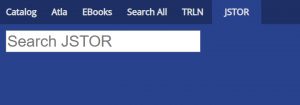
Another huge database of online journals and articles you can search directly from the Divinity Library’s website is JSTOR. This database is more broadly focused than Atla — it includes religion and theology, but also history, literature, anthropology, classical studies, cultural studies, economics, natural sciences, and many, many more.
6. ProQuest Dissertations and Theses

Atla and JSTOR and other online databases are fantastic when you’re trying to test-drive a thesis idea and you want to see who else has written on a topic. Another great resource for this sort of work is ProQuest’s database for dissertations and theses.
Because many dissertations have their full text available, ProQuest will use your keywords to search everything: the first results will be the most relevant ones, which have your keywords in the title. But the results will include any dissertation that mentions your search terms anywhere. For example, a search for “feminist theology,” for example, brings up over 57,000 results! A search for “thomas aquinas” yields over 33,000 results, while “bonaventure” brings up over 10,000.
Note that if you want to limit your results to truly recent work, there’s a helpful Date Range selector in the left-hand column:

You can also narrow your search by Subject, Language, University/Institution, etc. It’s also important to realize that scholars sometimes place an “embargo” on their dissertation while they work on revising and publishing it as a book, so if you are looking for a specific person’s work, you may not find it. Want to browse dissertations completed by Duke Divinity students? Check out this open access repository.
7. The Encyclopedia of the Bible and its Reception

Looking for a quick way into your research on a person, place, or topic in the Bible? EBR gives an overview of how a concept (e.g., “Abraham”) functions within Scripture, but also gives a sense of the concept’s reception history among Christians, Jews, and Muslims. From the publisher: “The Encyclopedia of the Bible and Its Reception (EBR) pursues a twofold task. Firstly, it comprehensively renders the current state of knowledge on the origins and development of the Bible according to its different canonic forms in Judaism and Christianity. Secondly, it documents the history of the Bible’s reception, not only in the Christian churches and the Jewish Diaspora, but also in literature, art, music, and film, as well as Islam and other religious traditions and current religious movements. With the help of a comprehensive search engine the online edition of the EBR makes the articles fully searchable.” Note: Volumes of EBR are still being published. Only volumes covering the first half of the alphabet are available!
8. Ministry Matters

Looking for online Bible commentaries, sermon resources, Bible study guides, and other tools for ministry? Ministry Matters gathers resources for worship, teaching, preaching, and more. You can search the “legacy library” (default setting), or use the orange banner at the top to navigate to the “research library.” You’ll find full text copies of commentaries on individual books of the Bible and more, including Abingdon Old Testament Commentaries, Abingdon New Testament Commentaries, Immersion Bible Studies, the New Interpreter’s Bible, and more.
9. Intelex Past Masters

Looking for primary source material? The Past Masters database includes full-text electronic editions of primary source materials in religion, philosophy, political thought and theory, education, classics, and more. Featured authors that might interest Divinity students are Thomas Aquinas, Augustine of Hippo, Anselm of Canterbury, Peter Lombard, and more. The database allows you to browse/read full texts online, or to search a collection by keyword. (For example, you could select the collection of Augustine’s writings and search “baptism” or “lord’s supper” to bring up places where these words appear in his treatises or sermons.) See our full tutorial for using this database here.
10. The Loeb Classical Library

The beautiful red- and green-covered sets in the Divinity School Library’s Reference Room are also available online through the Loeb Classical Library. The search function for this database is notoriously cumbersome, but you can always select the “Browse Authors” option to take you to an alphabetical list of authors, from which you can pull up the full text of individual volumes with facing English and Greek/Latin pages.
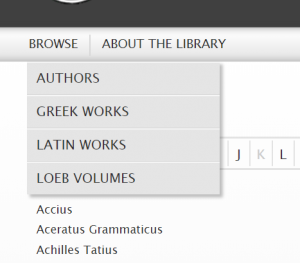
11. Library of Latin Texts Series A (and Series B)

The Library of Latin texts. Series A and the Library of Latin texts. Series B reproduce a massive amount of Latin literature (including early and medieval Christian literature) for online reading and searching. If you use any of the Corpus Christianorum series for your work, this online database helpfully reproduces many of those editions. From the main page, you can search by Author, Title, or Keyword, or you can go to the Table of Contents and browse by letter of the alphabet. Selecting “A” under the Table of Contents, for example, will bring up any author (and some titles) that begin with the letter A. Looking for Albertus Magnus? LLT-B has links to a dozen of his texts, including his commentary on Lombard’s Sentences.
12. Tools for Studying the Hebrew Bible

This site, put together by Duke’s own Professor Marc Brettler (Judaic Studies; Department of Religious Studies), gathers resources for learning the specialized discipline of studying Hebrew texts. Dr. Brettler has put together glossaries (English to Hebrew and Hebrew to English) that introduce students to major terms important for understanding the critical apparatus (i.e., the notes at the bottom of the page) of a scholarly edition of the Hebrew Bible. He also gives helpful introductions to different editions of the text, lexica, grammars, concordances, and more. For those interested in taking a deep dive into exegesis of the Hebrew text, this site provides an invaluable set of resources to get you started.
13. The Digital Karl Barth Library

Looking for Karl Barth’s writings specifically? The Digital Karl Barth Library gathers the massive The Church Dogmatics(Die kirchliche Dogmatik) in English and German versions, as well as the first 45 volumes of Barth’s Gesamtausgabe (including letters, sermons, etc.).
14. ProQuest Central
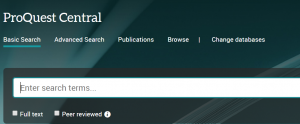
ProQuest Central is another massive online database, but this one has a focus on bringing together full texts of newspapers. Are you looking for contemporary coverage of historical events? Popular attitudes toward a certain event or cultural group or trend? ProQuest Central is a great way to browse for a topic in local, national, and international newspapers.

























